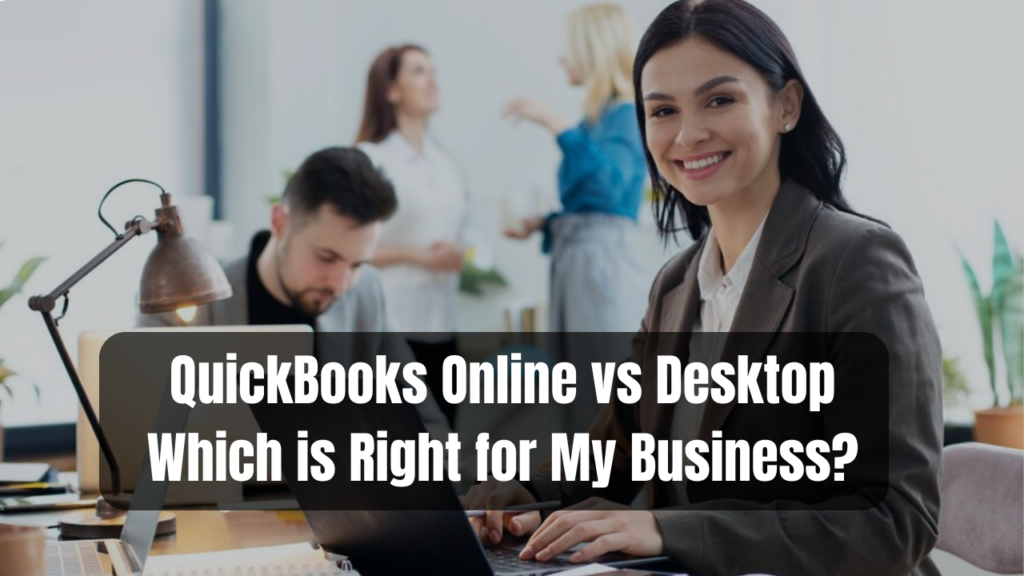QuickBooks is a popular accounting software platform offered by Intuit in two main flavors: the cloud-hosted online version and the traditional on-premises desktop edition. With comparable core features, is one better suited for today’s modern businesses than the other?
Determining which delivery model aligns better with your company’s needs depends on several factors. Keep reading for a detailed comparison on functionality, access, infrastructure planning, and pricing.
QuickBooks Online Feature
QuickBooks Online Feature While both share essential small business accounting capabilities like invoicing, reporting, and inventory management, notable differences exist:
Add-On Integrations
QuickBooks Online features an app marketplace with hundreds of third-party integrations for POS systems, payroll, CRM software, and more. Options are more limited on the desktop side.
Advanced Reporting
The Premier desktop edition includes industry-specific templates for manufacturing and hospitality needs unavailable in QuickBooks Online. But the cloud touts superior drill-down options.
Visual Workflow Support
You can build automated workflows and approval processes across related tasks in the web-based software. The desktop release lacks comparable process automation.
Mobile Functionality
Robust mobile apps enable remote invoice creation or data access for QuickBooks Online users. Desktop relies on remoting to the host computer for mobile access.
Both variants cover essential accounting, invoicing, payment processing, and reporting needs. The online edition offers more third-party integrations and superior mobile access, while the desktop version provides richer, industry-focused reporting templates.
Access Considerations
While QuickBooks Desktop gets installed locally on a company computer, QuickBooks Online runs in the cloud. This fundamentally changes how you interact with your data.
Quick Set Up
There is no installation needed to get started with the online version. Company sign-up and user access take minutes before launching the web interface.
Universal Access
Since QuickBooks Online uses cloud hosting, employees can log in from any laptop or mobile device with an internet connection. Access depends less on network infrastructure.
Data Residency
Desktop data resides on a local machine, while online data gets stored on external servers. Consider whether you have policies limiting financial data storage to local machines only.
Always Up-To-Date
No patches or upgrades are necessary with the web-based platform. QuickBooks Online gets updated periodically, so users can access the latest version automatically.
While QuickBooks Desktop is closer for businesses requiring on-site data storage, the online alternative minimizes IT dependency with rapid setup and universal access from anywhere.
Infrastructure Planning
Because desktop resides on company infrastructure, some additional planning helps support this long-term deployment:
Dedicated Machine
The desktop edition should be hosted on a consistently used server or PC accessible to finance staff. Avoid everyday employee computers to reduce performance issues.
Backups
Schedule periodic backups to avoid data loss from machine failures. Cloud data also gets backed up, but companies lack direct control over backup locations.
Upgrades
New versions of QuickBooks Desktop arrive each year, so companies need to evaluate new features against the effort needed to migrate data and reconfigure workflows.
Error Resilience
If the local network goes down, desktops lose access unless hosted software gets reconfigured online. Cloud elimination of single points of failure boosts resilience.
While the online option externalizes much of the infrastructure responsibility to Intuit, self-hosting QuickBooks does require more hands-on administration.
Pricing Considerations
Both solutions provide tiered offerings catering to different business sizes and willingness to pay:
One-Time vs. Recurring Fees
QuickBooks desktop requires a larger but one-off purchase cost, while online pricing follows a smaller but recurring subscription model.
Support Costs
Phone and chat support incurs extra fees for desktop users, but online support gets bundled for no added cost, depending on tier. Advanced plans do provide more robust support, however.
User Pricing
The online version charges per user license purchased, while desktop costs stay firm regardless of users added. Scale users count closely with the SaaS model.
Free Trial
A free 30-day online trial helps qualify the web product’s suitability for a business. No equivalent exists on the desktop side, requiring a financial commitment outright before testing suitability.
Online subscriptions bring more flexibility, allowing you to change plans to match business needs over time. But desktop may suit buyers wanting to own their software permanently while accepting higher support costs.
Frequently Asked Questions
Some common questions small business owners have about using QuickBooks Online vs. QuickBooks Desktop are:
Is my data secure if I use QuickBooks online?
Intuit uses strong 256-bit SSL encryption for all data in transit and rests with third-party data centers that are SOC 1/SOC 2/SSAE 16 audited. QuickBooks Online offers robust security standards for cloud financial solutions.
Can I switch from desktop to online later on?
Yes, Intuit provides tools to help move your company file from the QuickBooks desktop to the online product. Any historical data, like past transactions, customers, items, etc., can migrate over to retain historical continuity before transitioning workflows to the cloud.
Determining QuickBooks Online vs. Desktop Edition boils down to a company’s appetite for cloud solutions versus having on-premise infrastructure control. Testing both options when possible reduces guesswork if you are stuck between choices. Enterprise-grade security and extensive integration capabilities make the newer cloud product a viable contender against its well-entrenched desktop predecessor.

